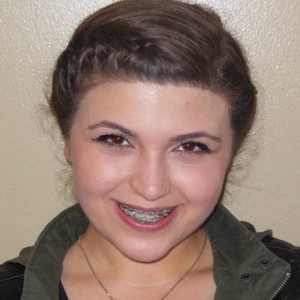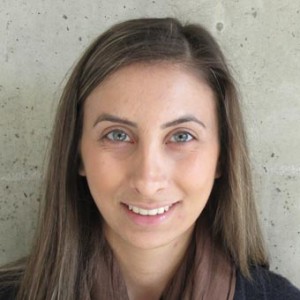Marine Vardanyan
Editor
In the October 2013 issue of Hye Sharzhoom, excerpts from family histories prepared by students who had enrolled in a Spring 2013 course taught by Dr. Sona Haroutyunian (University of Ca’ Foscari Venice), Kazan Visiting Professor in Armenian Studies, were published. Following are the three remaining excerpts:
 Suren Oganessian
Suren Oganessian
My grandfather, Suren Oganessian the First, was born in Meghri, Armenia, 1905. A hard time to grow up for almost any Armenian, to be sure. He disliked talking about his childhood, so I do not even know the names of his family members, but what I do know is that he was the only surviving member of his family. After leaving the orphanage in the 1920’s, he got a job as a school-teacher in mathematics, but during this time, he also secretly joined the Dashnak political party.
In 1930, Suren’s Dashnak comrades brought a stencil printing machine into his house so that they could print anti-government booklets. One of these people, however, turned out to be a communist spy. On November 3, 1930, police arrested Suren along with the rest of his group. He was taken to Medekh prison in Tiflis, Georgia. He writes in his memoir, “The cells were so crowded with these miserables that even the drops of water from the ceiling could not find their way to the floor.” In his memoir, Under Stalin’s Sun: Reflections, 1920-1945, tr. by J. Tashjian (Los Angeles, 1981), Suren notes that while he was a legitimate political prisoner, the majority of the prisoners were simply villagers, incarcerated for petty things like stealing a loaf of bread or owning more cows or goats than the government allowed.
In July 1931 Suren was transported from Medekh to a prison in Tashkent, Uzbekistan and in the spring of 1932 to yet another prison in Moscow, where he spent most of the time in solitary confinement, before being loaded on a crowded train with other prisoners to a concentration camp in Siberia in October, 1933…
April 17, 1935, was a rest day at the camp, when many of the guards traveled to nearby villages to shop and mingle with Russian women. “If you’re really planning on escaping, this is the time. You’ll never have a better chance than this,” Suren told himself. Here his autobiography becomes scant, but what I do know is that he managed to arrive in America…
When my father was young and his family had immigrated to Chicago, my grandfather offered his advice, learned from his terrible five years as a Gulag prisoner. “Son, never get involved in politics,” he would say, holding up the hand where two of his fingertips had been severed during his torturous interrogations, “Look what it did for me.”
My grandfather Asatur was born in 1909. This is part of his story.
“I remember being happy in Kars in a complete family, with two brothers, a sister, and parents that I loved so much, but one day it all ended. Mom would always say, ‘As long as you are healthy that is all I want.’ But this little happiness didn’t last long for us. We were separated by a devastating event that took place in 1915.
I was six years old. I didn’t know who we were running from, why we were going away from our own town… As the hours passed I realized that I lost my mom and my two brothers. I sat on a rock and began to cry, because I didn’t know what else to do. The sadness of losing my mother was stronger than the hunger I was feeling. I hadn’t eaten for six days. Out of nowhere, two very nice looking people came up to me and started speaking with me. I couldn’t understand them as they were speaking in Russian. All I remember was that the man grabbed me and took me to their big house. The lady, realizing that I couldn’t understand her, began to speak with me in my language and I felt a relief. But I didn’t want her to be my new mother! Was this the end? Was I never going to see my mom and brothers? I didn’t want to believe that. Every night I would remember our house in Kars and my family that I lost…
Months passed. One day my stepmom and I were in the carriage, going to Alexandropol (today’s Gyumri), when suddenly I heard a lady scream, ‘Asatur!’ I turned around. It was my mother!”
Vartanush Mesropyan
My grandmother! She is sitting in the living room alone, with her legs crossed. She has a very serious face and keeps looking around. She feels weak and has fear inside her eyes. She tries to whisper to herself but her voice is coming out loud. At times she does not know where she is and does not understand how her life flew by so quickly.
She continues speaking: “Where is my husband? Where is my father? Where is my mother? And where is my older son? I miss them.” She begins crying and I hear her wiping her tears and nose.
“I do not know where I was born exactly nor do I remember who my mother was,” she starts her story. “When I was six months old she passed away. With no choice, my father gave away my twin to his friend and me to his other friend… At the age of nineteen I met my thirty-one year old husband who had come to Bulgaria from Greece to find work. During the same year, I became pregnant and my husband and I decided to move to Armenia…
On May 11, 1965, my husband died from a severe infection and I was left with my 19, 14, and 8 year old children…
For many years I have struggled, I have seen so many deaths and have buried so many dead. The most painful time was when I buried my own husband. He was not able to see his children, grandchildren, and great grandchildren grow up. I am still growing strong as an 86 year old woman. I have three proud children, seven grandchildren, and ten great-grandchildren. I am living a happy life with my loved ones. I pray to God for good health, peace, and happiness.
 Hye Sharzhoom Armenian Action
Hye Sharzhoom Armenian Action

